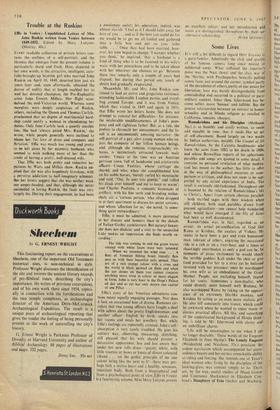Trouble at the Ruskins
Effie in Venice : Unpublished Letters of Mrs. John Ruskin written from Venice between 1849-1852. Edited by Mary Lutyens. (Murray, 40s.)
EVERY readable collection of private letters con- tains the outlines of a self-portrait: and the likeness that emerges from the present volume is particularly sharp and fresh. Here, depicted in her own words, is the attractive, intelligent, care- fully-brought-up Scottish girl who married John Ruskin on April 10, 1848, deserted him just six years later and, soon afterwards, obtained the decree of nullity that at length enabled her to wed her devoted champion, the Pre-Raphaelite artist John Everett Millais. Her flight scan- dalised the mid-Victorian world. Whereas some moralists were deeply suspicious of Ruskin, others, including the Queen and Thomas Carlyle. proclaimed that no degree of matrimonial hard- ship could justify a woman in abandoning her duties. Only Jane Carlyle took a quietly sensible line. She had 'always pitied Mrs. Ruskin,' she wrote, while people generally were inclined to blame her.'for love of dress and company and flirtation.' Effie was much too young and pretty to be left alone by her eccentric husband, who seemed to wish nothing more of her than the credit of having a pretty, well-dressed wife.
That Effie was both pretty and seductive her pictures by Watts and Millais show. Ruskin im- plied that she was also hopelessly frivolous, with a perverse addiction to half-imaginary ailments. But her letters suggest that she was neither weak nor empty-headed: and that, although she never succeeded in loving Ruskin. the fault was very largely his. During their engagement, he had been
a passionate suitor; his adoration, indeed, was almost slavish: 'I feel as if i should faint away for love of you ... and as if the best you could do for me would be to get me all folded and gathered into a little box- and put on your toilet table. . .' Once they had been married, how- ever. his tone began to change. 'I wonder whether you think,' he inquired, 'that a husband is a kind of thing who is to be fastened to his wife's waist with her pincushion and to be taken about with her wherever she chooses to go.' Between these two remarks only a couple of years had elapsed: but during that period any touch of desire had gradually evaporated.
Meanwhile, Mr., and Mrs. John Ruskin con- tinued to lead an active and gregariobs existence. attending fashionable London parties and travel- ling around Europe; and it was from Venice, which they visited in 1.849 and again in 1851. that Effie wrote her letters home. She does not attempt to conceal her difficulties-- for instance. the intolerable meddlesomeness of John's pom- pous and self-righteous father. But, as a rule, she prefers to chronicle her amusements; and the te- sult is an uncommonly amusing narrative --the self-portrait of a gay, alert young woman who en- joys the company of her fellow human beings, and, although she remains irreproachably vir- tuous, is instinctively attracted towards male society. Venice at the time was an Austrian garrison town. full of handsome and aristocratic officers Count Festitics. whose carriage she shared, and who, when she complimented him on his noble horses, 'merely curled his moustache and said, "Oui, ils sont tres gentile," and rolled his cloak over himself and me to keep us warm': and Charles Paulizza, a romantic lieutenant of artillery, with his fine teeth and brooding melan- choly air, a 'curious person,' who often dropped in at their apartment to discuss his secret sorrows, and whose 'affection for us,' she noted, 'is some- thing quite extraordinary.'
Effie, it must be admitted, is more interested in' her dresses and bonnets than' in the details of Italian Gothic architecture. But natural beauty she does not disdain: and a visit to the unspoiled Lido makes an impression she finds worth re- cording: The tide was coming in and the green waves crested with white foam were very Splendid. . . . When we returned the wind rose. . . . A fleet of Venetian fishing boats literally flew past us with their beautiful sails spread. They are of a rich orange colour with a cross and the world in black painted on them and when the sun shines on them you cannot conceive anything more vivid in colour or more elegant in form. John is very busy in the Doge's Palace all day and as yet has only drawn one capital of one Pillar. . . .
Effie's story of her Venetian adventures con- tains many equally engaging passages. Nor does it lack an occasional hint of drama. Rumours cir- culate that two young officers have fought a duel with sabres about the pretty Englishwoman: and another officer—English by birth--sneaks into her rooms and steals her jewellery. But, while Effie's feelings are repeatedly aroused. John's self- absorption is very rarely troubled. He goes his solitary way, observing, measuring, sketching, still pleased that his wife should present a decorative appearance, less and less aware that under her new tulle dress—'quaint. white, with little rosettes or bows or knots of divers coloured riband . . . on the gothic principle of no one colour being like the next to there may per- haps lurk a restive heart and a healthy, sensuous, impatient body. Both from a biographical and from a psychological point of view, Effie in Venice is a fascinating volume. Miss Mary Lutyens proves
an excellent editor: and her introduction and notes a-e distinguished throughout by their un-


































 Previous page
Previous page